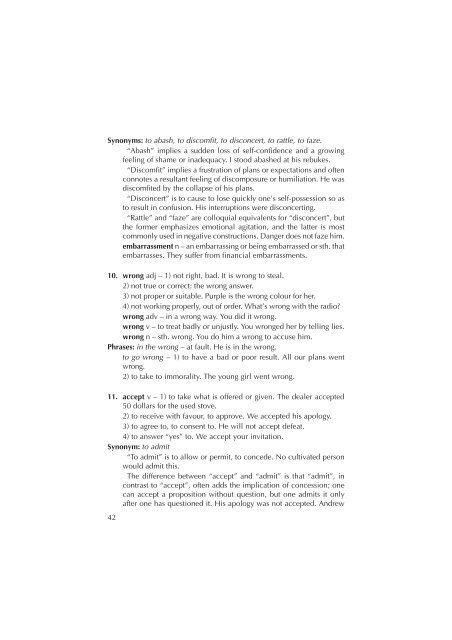ENGLISH FOR INTERMEDIATE STUDENTS
ENGLISH FOR INTERMEDIATE STUDENTS
ENGLISH FOR INTERMEDIATE STUDENTS
You also want an ePaper? Increase the reach of your titles
YUMPU automatically turns print PDFs into web optimized ePapers that Google loves.
Synonyms: to abash, to discomfit, to disconcert, to rattle, to faze.<br />
“Abash” implies a sudden loss of self-confidence and a growing<br />
feeling of shame or inadequacy. I stood abashed at his rebukes.<br />
“Discomfit” implies a frustration of plans or expectations and often<br />
connotes a resultant feeling of discomposure or humiliation. He was<br />
discomfited by the collapse of his plans.<br />
“Disconcert” is to cause to lose quickly one’s self-possession so as<br />
to result in confusion. His interruptions were disconcerting.<br />
“Rattle” and “faze” are colloquial equivalents for “disconcert”, but<br />
the former emphasizes emotional agitation, and the latter is most<br />
commonly used in negative constructions. Danger does not faze him.<br />
embarrassment n – an embarrassing or being embarrassed or sth. that<br />
embarrasses. They suffer from financial embarrassments.<br />
10. wrong adj – 1) not right, bad. It is wrong to steal.<br />
2) not true or correct: the wrong answer.<br />
3) not proper or suitable. Purple is the wrong colour for her.<br />
4) not working properly, out of order. What’s wrong with the radio?<br />
wrong adv – in a wrong way. You did it wrong.<br />
wrong v – to treat badly or unjustly. You wronged her by telling lies.<br />
wrong n – sth. wrong. You do him a wrong to accuse him.<br />
Phrases: in the wrong – at fault. He is in the wrong.<br />
to go wrong – 1) to have a bad or poor result. All our plans went<br />
wrong.<br />
2) to take to immorality. The young girl went wrong.<br />
11. accept v – 1) to take what is offered or given. The dealer accepted<br />
50 dollars for the used stove.<br />
2) to receive with favour, to approve. We accepted his apology.<br />
3) to agree to, to consent to. He will not accept defeat.<br />
4) to answer “yes” to. We accept your invitation.<br />
Synonym: to admit<br />
“To admit” is to allow or permit, to concede. No cultivated person<br />
would admit this.<br />
The difference between “accept” and “admit” is that “admit”, in<br />
contrast to “accept”, often adds the implication of concession; one<br />
can accept a proposition without question, but one admits it only<br />
after one has questioned it. His apology was not accepted. Andrew<br />
42
















